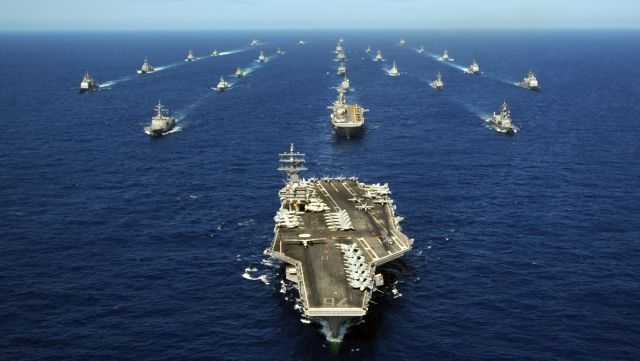Secretary of State John Kerry vowed Friday that the United States would defend Japan against attack including over islands claimed by China as tensions boil between the Asian powers.
Kerry, who said he would visit China next week, met in Washington with Japanese Foreign Minister Fumio Kishida and reaffirmed the 1960 treaty that commits the United States to protect its ally.
“That includes with respect to the South China Sea,” he said, before correcting himself to say the East China Sea, where China and Japan have conflicting claims.
Fears of conflict rose in November when China imposed an Air Defense Identification Zone over much of the East China Sea.
Beijing says it now requires notification from planes crossing a group of islands administered by Tokyo, known in Japanese as the Senkaku and in Chinese as Diaoyu.
“The United States neither recognizes nor accepts China’s declared East China Sea ADIZ and the United States has no intention of changing how we conduct operations in the region,” Kerry said.
The United States and its allies are increasingly concerned China will take similar action in the South China Sea, where the Philippines in particular has voiced worries about Beijing’s maritime claims.
Kishida, for his part, extended an invitation for President Barack Obama to make a state visit to Japan.
Diplomats say Obama is likely to visit Japan on an April tour of Asia, although Kerry is not expected to stop in Tokyo on his upcoming trip.
Kishida was visiting Washington after a rare open disagreement between the two allies.
The United States voiced disappointment in December when Prime Minister Shinzo Abe, known for his conservative views, paid a pilgrimage to the Yasukuni shrine which honors 2.5 million Japanese war dead including convicted war criminals from World War II.
Abe’s visit outraged China and also fellow US ally South Korea. Both countries frequently accuse Japan of insufficient remorse for its aggression a century ago.
Kishida told Kerry that Japan valued its relationship with South Korea despite their “difficult issues,” saying the two democracies needed to work together in the face of nuclear-armed North Korea.
“Going forward, we will make tenacious efforts in order to build a cooperative relationship with the Republic of Korea from a broad perspective,” Kishida said.
Kishida also highlighted progress under Abe in relocating the Futenma air base within the island of Okinawa — an issue that has cast a pall for years over defense ties between the two countries.
Kerry, in turn, praised Japan for addressing another longtime sore point by ratifying the Hague convention that sets procedures for the return of children abducted by one parent across international boundaries.
Kerry’s latest trip to Asia comes as critics charge that his focus in his year in office on the Middle East has left US allies in Asia in want of a more robust presence by Washington.
Kerry said he was committed to the goal set in President Barack Obama’s first term of putting a greater US focus on Asia, and said the strategy was impossible without “ironclad guarantees” between the United States and Japan.










